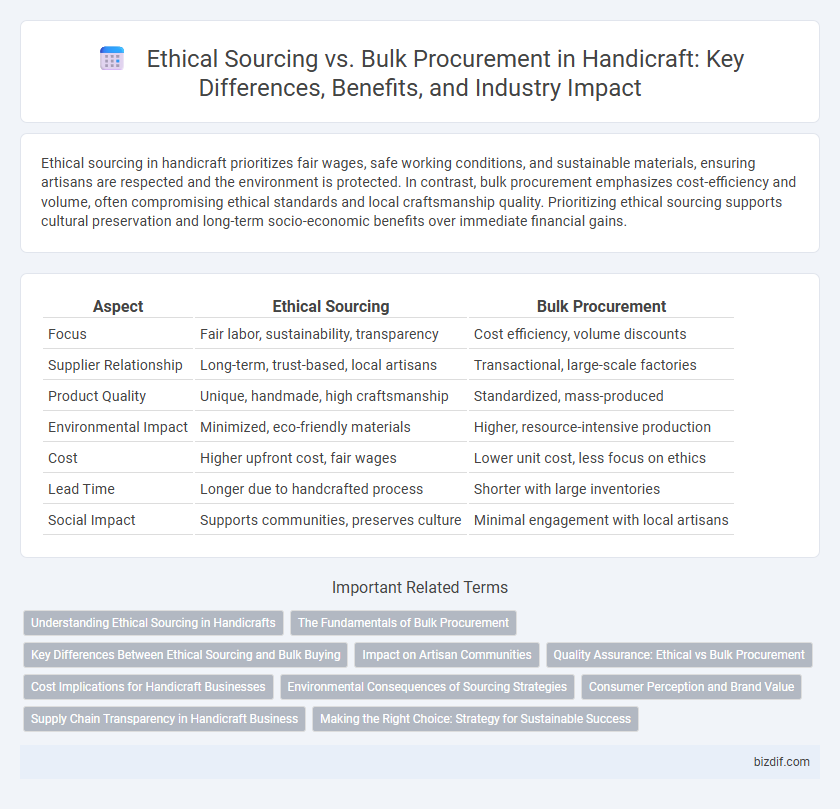Ethical sourcing in handicraft prioritizes fair wages, safe working conditions, and sustainable materials, ensuring artisans are respected and the environment is protected. In contrast, bulk procurement emphasizes cost-efficiency and volume, often compromising ethical standards and local craftsmanship quality. Prioritizing ethical sourcing supports cultural preservation and long-term socio-economic benefits over immediate financial gains.
Table of Comparison
| Aspect | Ethical Sourcing | Bulk Procurement |
|---|---|---|
| Focus | Fair labor, sustainability, transparency | Cost efficiency, volume discounts |
| Supplier Relationship | Long-term, trust-based, local artisans | Transactional, large-scale factories |
| Product Quality | Unique, handmade, high craftsmanship | Standardized, mass-produced |
| Environmental Impact | Minimized, eco-friendly materials | Higher, resource-intensive production |
| Cost | Higher upfront cost, fair wages | Lower unit cost, less focus on ethics |
| Lead Time | Longer due to handcrafted process | Shorter with large inventories |
| Social Impact | Supports communities, preserves culture | Minimal engagement with local artisans |
Understanding Ethical Sourcing in Handicrafts
Ethical sourcing in handicrafts ensures materials and labor are obtained responsibly, respecting artisans' rights and promoting sustainability. It prioritizes fair wages, safe working conditions, and the preservation of traditional craftsmanship techniques. This approach contrasts with bulk procurement by emphasizing quality, cultural value, and social impact over mere cost efficiency.
The Fundamentals of Bulk Procurement
Bulk procurement in handicraft emphasizes large-scale acquisition of raw materials, minimizing costs through volume discounts and streamlined supply chains. This approach prioritizes efficiency and standardized quality, often relying on consistent suppliers to meet high demand. Understanding bulk procurement fundamentals helps artisans balance cost-effectiveness with timely production without compromising material integrity.
Key Differences Between Ethical Sourcing and Bulk Buying
Ethical sourcing emphasizes fair wages, sustainable materials, and transparent supply chains to support artisan communities and minimize environmental impact. Bulk procurement prioritizes cost efficiency and large volume discounts, often sourcing from mass production channels with less focus on social or ecological responsibility. The key difference lies in ethical sourcing's commitment to social and environmental standards, whereas bulk buying focuses primarily on maximizing affordability and scale.
Impact on Artisan Communities
Ethical sourcing in handicrafts prioritizes fair wages, safe working conditions, and cultural preservation, directly benefiting artisan communities by empowering local economies and sustaining traditional skills. In contrast, bulk procurement often emphasizes cost-efficiency over social responsibility, risking exploitation and the erosion of craftsmanship quality. Supporting ethical sourcing ensures the long-term viability of artisan livelihoods and promotes socially conscious consumerism.
Quality Assurance: Ethical vs Bulk Procurement
Ethical sourcing in handicrafts emphasizes stringent quality assurance by prioritizing artisan craftsmanship and sustainable materials, ensuring each product reflects authenticity and durability. Bulk procurement often compromises on quality due to mass production techniques and cost-cutting measures, leading to inconsistent standards. Maintaining high quality in ethical sourcing supports fair trade principles and preserves cultural heritage, which bulk procurement typically overlooks.
Cost Implications for Handicraft Businesses
Ethical sourcing in handicraft businesses often leads to higher costs due to fair wages, sustainable materials, and community support, reflecting a commitment to social responsibility. Bulk procurement reduces expenses by purchasing large quantities at discounted rates, but may compromise craftsmanship quality and artisan livelihoods. Balancing cost implications requires integrating fair trade principles without sacrificing scalability and profitability in the handicraft market.
Environmental Consequences of Sourcing Strategies
Ethical sourcing in handicrafts prioritizes sustainable materials and fair labor, significantly reducing environmental degradation by minimizing resource depletion and pollution. Bulk procurement often emphasizes cost efficiency, leading to higher carbon footprints through mass production, increased waste, and exploitation of non-renewable resources. Choosing ethical sourcing supports biodiversity conservation and promotes eco-friendly practices that mitigate climate change impacts in the handicraft industry.
Consumer Perception and Brand Value
Ethical sourcing in handicrafts emphasizes fair wages, sustainable materials, and artisan empowerment, which significantly enhances consumer trust and brand loyalty. Bulk procurement often prioritizes cost-efficiency but can lead to perceptions of exploitative labor practices and diminished product authenticity. Brands committed to ethical sourcing typically experience stronger consumer engagement and a more positive reputation in competitive markets.
Supply Chain Transparency in Handicraft Business
Ethical sourcing in the handicraft business prioritizes supply chain transparency by ensuring artisans receive fair wages and materials are sustainably sourced, contrasting with bulk procurement which often lacks detailed oversight. Transparent supply chains enable brands to verify the origin of raw materials, maintain quality standards, and uphold social responsibility commitments. Emphasizing traceability helps build consumer trust and supports the preservation of traditional craftsmanship.
Making the Right Choice: Strategy for Sustainable Success
Ethical sourcing in handicrafts prioritizes fair wages, sustainable materials, and support for local artisans, fostering long-term community growth and environmental stewardship. Bulk procurement often reduces costs but can compromise quality, exploit labor, and deplete resources, undermining sustainable success. Choosing a strategic balance that values transparency, traceability, and social impact ensures responsible growth and preserves cultural heritage.
Ethical Sourcing vs Bulk Procurement Infographic

 bizdif.com
bizdif.com